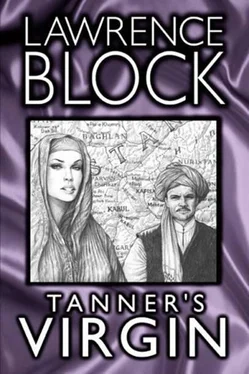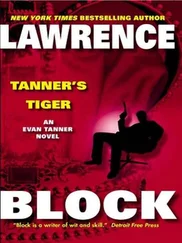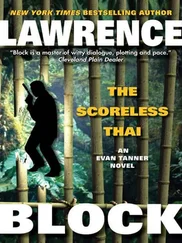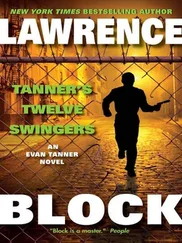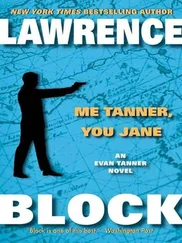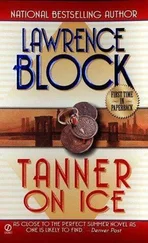“There is a remarkable resemblance.”
“The zebra is a heaven-sent animal.” Gershon’s eyes shone. “For example, a portion of his flesh when fried is an exceptionally good accompaniment to eggs for breakfast. They say that it tastes much like bacon, but of course I have no basis for comparison.”
I finished one of the sandwiches. “The, uh, zebras,” I said. “Are they imported?”
“Oh, no. The raising of zebras is a native Israeli industry. Yet perhaps because the breeders wish to protect their secrets, one rarely actually sees these fine black-and-white striped animals anywhere in the nation. However, on a drive through the countryside one might hear their characteristic cry from within one of their pens.”
“What sound do zebras make?”
“Oink,” Gershon said. “Ah, Evan, my comrade, one requires a Talmudic turn of mind to contend with life in modern Israel. Between the theocracy and the round-shouldered ghetto dwellers and the lice-ridden Sephardim, one has one’s hands full in letting the country take her place among the nations of the world. Do you know that there are fools who would return Sinai to Nasser and the Golan Heights to Syria? There are even those who would give back Jerusalem to Hussein. But not a square foot of territory shall be returned.”
“There is talk that Sinai and the west bank of the Jordan might be given back as part of a peace settlement,” I said.
“Peace?” Gershon sighed heavily. “Peace,” he said. “Peace is a bottle of beer, Evan.” This statement confused me until a while later, after Zvi had joined us, Gershon served us some local beer. The brand name was Shalom. “We have no need of peace, Evan. In what sort of war does the victor make concessions to the vanquished? Almost a year and a half ago, in June, after years of provocation, the Arab attack was crushed in a lightning war of six days. Now the deserts shall bloom and we shall have renewed living space for the Jews of the world who will return to their homeland. Who can even speak of peace? Every day there are new border incidents. The people grow strong with victory. They have a sense of their historic mission…”
The mind plays tricks, translating phrases from one language to another. Lightning war becomes blitzkrieg, living space metamorphoses into lebensraum. I remembered the Sternist oath I had sworn in a cold-water flat on Attorney Street, pledging to work for the restoration of Israel to its historic boundaries from Dan to Beersheba on both sides of the Jordan. The language of the oath, I realized, was somewhat inconclusive; Dan and Beersheba set the north-south limits, but just how far “Greater Israel” might extend east and west of the Jordan was subject to varying interpretation.
Unwelcome thoughts. I bit deeply into my zebra sandwich, chewed, swallowed. And, when Gershon paused, I began to talk about Afghanistan and a girl named Deborah Horowitz.
I went over the story a second time when Zvi joined us. The tale of Phaedra’s fate could not have had a more appreciative audience. A nice Jewish girl kidnaped by Arabs. I explained that the Afghans were not Arabs. But they were Moslems, were they not? I admitted that they were. Moslems, Arabs, it was the same thing, was it not? Well, I said, one could stretch a point. Zvi cited the commandment in the Torah that the Daughters of Israel should not prostitute themselves. This sidetracked Gershon momentarily; he began reminiscing about a Yemenite immigrant in Jaffa, a hooker with almost unbelievable muscular control. Zvi glanced sharply at him and he abandoned the subject in midsentence.
“We will go with you,” Zvi said, firmly. “We will rescue this Deborah and return her to the land of her forefathers. We shall lead her out of the land of Afghanistan, out of the house of bondage.”
The thought was a tempting one. I extended the metaphor mentally and imagined the waters parting so that Zvi and Gershon and Phaedra and I might cross the Arabian Sea on dry land.
“You have work here,” I said. “And the rescue of Deborah may be accomplished with little difficulty.” I wished I believed this. “I need only to get from here to Jordan. Then I will be able to proceed by myself.”
“Ah. You wish to enter Jordan?”
“Yes.”
“But this will be no problem for you, will it, Evan?” Zvi smiled. “You are an American and can enter Jordan at will.”
Gershon said, “But he has been to Israel. Will Hussein admit him?”
“Perhaps. The Egyptians are stricter about that sort of thing, of course, but the Jordanians-”
I cut in, explaining that I didn’t happen to have an American passport handy, and couldn’t enter Jordan with it if I did. I would have to slip across the border. “I suppose this would have been easier before the war,” I added, “when the Jordanians held the west bank. But if you could tell me the best place to cross-”
The two exchanged glances. Zvi said something to Gershon about the absolute secrecy of their mission, and Gershon pointed out that I was a loyal Sternist and had performed great service in Czechoslovakia, not to mention my generous financial gifts to the organization. Zvi thought this over and decided in my favor.
“We will be part of a group crossing the border tonight,” he said. “It is possible that you could join us.”
“I am grateful.”
“It will be necessary for you to dress as an Arab. We can provide suitable clothing, but it would be advantageous if you could learn a few words of Arabic in the hours that remain.”
I said in Arabic that this would present little difficulty. Zvi raised an eyebrow. “Next you will tell us that you can ride a camel.”
“I will tell you no such thing.”
“Ah. But you will learn. We drive east to Rammun. Do you know it? It is not far from Jericho, but Joshua did not level its walls and so it is less well known. A small old town, most of it abandoned when the Jordanians withdrew across the river. Our camels are waiting there.”
In the seventeenth centuryan Afghan nobleman named Ali Mardan Khan demonstrated his public spirit by raising national monuments of one sort or another in and around Kabul. The greatest of these was an arcaded and roofed bazaar called Chihâr Châtâ. Its four arms had an aggregate length of about 600 feet, with a breadth of about thirty. Kabul is a beautifully situated city to begin with, nestled among the mountains with peaks rising on three sides of the city. It is a city of striking architecture, and Chihâr Châtâ, it would seem, was something rather extraordinary.
In 1842 a British general named Pollock evacuated Kabul. On the way out he leveled Chihâr Châtâ to punish the city for its treachery. Leveled it. Knocked the whole thing down, that is, so that all the king’s horses and all the king’s men couldn’t.
I couldn’t really blame General Pollock. Kabul was that kind of a town. Treacherous.
By the time I had been in the city for all of twenty-one hours, they had made three attempts on my life.
That’s treacherous.
But wait a minute – wasn’t he in Israel a minute ago? Something about getting on a camel?
True. Except that it wasn’t a minute ago, really, but several weeks ago, and since that camel (and if you have never ridden a camel you cannot possibly know how bad they are) there had been donkeys and mules and broken-down cars and a truck and a lot of walking and, all in all, an almost incredible spate of boredom. Well, not boredom, exactly. It wasn’t boring sitting around a mountain campfire with a band of Kurdish rebels. It wasn’t boring at a village a few miles from Teheran, eating sheep’s bladder stuffed with cracked wheat and almonds and apricots, which is at least a thousand times better than it sounds. The mountain views through Afghan Turkistan were never boring, nor were the languages (some new, some half-known) or the people.
Читать дальше
